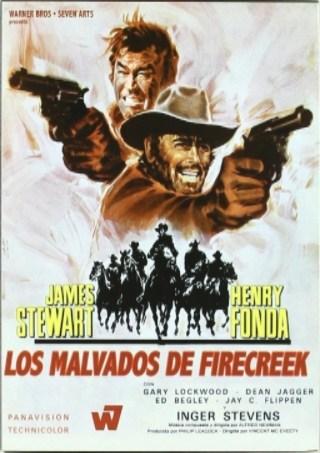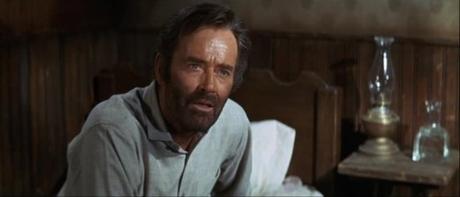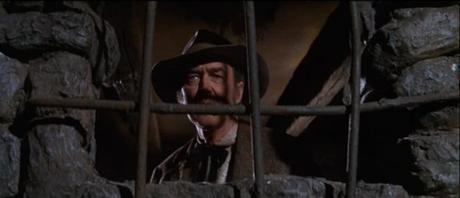
Somewhere in the mid-60s the western began to be less attractive, both in terms of the look and the mood. It’s something which seemed to creep into the genre gradually as the decade wore on. You could even say it made occasional forays before retreating again, but it seemed to visit more frequently and stay a little longer each time. What I’m speaking about here is difficult to put my finger on exactly; it’s got to do with images which haven’t got quite the snap that was once the case, and an attitude of weariness and melancholy. Firecreek (1968) comes close to encapsulating the point I suppose I’m trying to make here – not a bad film by any means, but not an especially attractive one either.
Firecreek is a quiet town, a place where nothing all that important happens and people just go about their daily business without much serious worry. And yet it’s a place lacking something else, something vital whose absence is soon to be highlighted by the arrival of a handful of men. Larkin (Henry Fonda) is gunman, an enforcer for hire who has spent his life roaming the frontier plying his trade, and that of the ragtag bunch of followers he attracts, in the service of the highest bidder. A gunshot wound, the need to rest up and the suggestion of pursuit by unnamed figures has brought him and his men to Firecreek. And it’s here that they run into Johnny Cobb (James Stewart), farmer and family man, and part-time sheriff if or when the need arises. Cobb displays none of the characteristics or indeed the trappings one might normally associate with a lawman, and when this role is eventually revealed it represents as much a surprise to Larkin’s band of toughs as it does to the viewer. These new arrivals profess no interest in hanging around any longer than is necessary while Cobb, and indeed virtually the entire population, takes the view that confrontation is to be avoided at all costs. However, any place where drink is available as well as the presence of that other genuine rarity on the frontier, women, trouble has a habit of turning up too. When violence does burst onto the scene and shatters the tranquility of Firecreek, Cobb in particular finds himself driven towards confrontation. On the surface, he’s forced to face off against the men who have threatened the security of his town, but it’s really a challenge posed by the passive mood of the settlement itself and the withdrawal from life he’s been hitherto happy to embrace.

Firecreek was directed by Vincent McEveety, a man who worked extensively on television (most notably on Gunsmoke) but whose work I’m not very familiar with. Personally, I found the pacing of the movie a bit too leisurely, taking a long time to set up the central situation and then slacking off again before racing towards the resolution. The idea of a group of dangerous men resting up in a small and isolated settlement, while their leader tries to recuperate, and subsequently causing mayhem recalls de Toth’s Day of the Outlaw in some respects. However, Firecreek never reaches those dramatic heights, nor does it have the tight focus of that picture. Aside from the community in peril aspect, it attempts to blend in too many other themes and thus weighs itself down. The main ideas seems to be that of a town which has become a kind of repository for those who have lost their way or lost their nerve in life, a sort of limbo state on the western frontier. That’s an interesting enough concept, the antithesis of the thrusting pioneer spirit typically portrayed in the genre, but it’s introduced late in the day and the back stories of the characters are sketched too lightly to bear it out successfully. Alongside this there are allusions to the conflict between civic duty and one’s responsibilities to family, questions about race and miscegenation, and a whole range of powerful emotions from desire and jealousy through loss and bitterness – yet none of them feel all that fully developed. In addition to all this, much of the plot unfolds within the drab confines of the town and there’s therefore limited scope for cinematographer William H Clothier to show off his unquestioned skills behind the camera.

Fonda and Stewart were big names in cinema and both had their fair share of important westerns behind them, each having worked with the likes of Ford and Mann in the past. Stewart got the meatier role, one which afforded him the chance to progress from his characteristic down-home humility to something approaching the emotional pain Mann so expertly coaxed from him. Although the transformation his character undergoes in the third act doesn’t reach the intensity of those tortured souls he gave us in the previous decade there’s still a touch of that inner rage and frustration he was so adept at tapping into. Fonda’s villain is one of those men who senses the end of the line nearing, a throwback to wilder days who sees he’s fast becoming an anachronism yet can’t envision himself doing anything else. The supporting cast is impressive even though some of the members aren’t used as effectively as they might have been. Of the women, Inger Stevens has the most to do and gets to play a decisive part in the final resolution. Conversely, Barbara Luna and an exceptionally sour Louise Latham play potentially interesting characters whose backgrounds are never fully explored. Gary Lockwood makes for an extraordinarily dangerous henchman with a tinderbox temperament and James Best nails both callous and dumb. As is so often the case, Jack Elam is more or less wasted as the senior member of Fonda’s gang but he’s always a pleasure to watch all the same. With the likes of Dean Jagger, John Qualen, Ed Begley and Jay C Flippen all contributing turns of varying significance, it shouldn’t be hard to appreciate the depth of talent involved in this movie.
Firecreek was released on DVD in the US many years ago, on a disc which has The Cheyenne Social Club on the flip side, by Warner Brothers. The scope image is presented anamorphically and looks fine for the most part. Colors look reasonable to my eye but, as I said at the beginning, it’s not what I’d term a handsome looking movie. The only extra feature is the theatrical trailer. Despite the excellent cast and a plot that offers plenty to mull over, I can’t say I like this movie a lot. The tone, look and central message are all downbeat, and relentlessly so. Films of this era can, at times, leave me with that vaguely dissatisfied feeling. I have a hunch that filmmakers then were striving to achieve what they hoped would be another layer of realism but it’s possible to lose some of that magical and almost indefinable quality that can make cinema such an alluring form of art and entertainment. All told, Firecreek is a film which doesn’t quite work for me – others may react differently of course.
